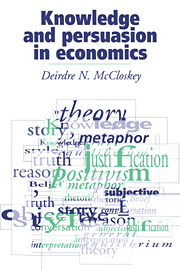Book contents
- Frontmatter
- Contents
- List of figures and tables
- Preface
- Acknowledgments
- Part I Exordium
- Part II Narration
- Part III Division
- Part IV Proof
- 9 The rise of a scientistic style
- 10 The rhetoric of mathematical formalism: existence theorems
- 11 General equilibrium and the rhetorical history of formalism
- 12 Blackboard Marxism
- 13 Formalists as poets and politicians
- Part V Refutation
- Part VI Peroration
- List of works cited
- Index
13 - Formalists as poets and politicians
Published online by Cambridge University Press: 01 February 2010
- Frontmatter
- Contents
- List of figures and tables
- Preface
- Acknowledgments
- Part I Exordium
- Part II Narration
- Part III Division
- Part IV Proof
- 9 The rise of a scientistic style
- 10 The rhetoric of mathematical formalism: existence theorems
- 11 General equilibrium and the rhetorical history of formalism
- 12 Blackboard Marxism
- 13 Formalists as poets and politicians
- Part V Refutation
- Part VI Peroration
- List of works cited
- Index
Summary
The classic definition of economics is Marshall's: “the study of mankind in the ordinary business of life” (Marshall 1920, p. 1). The literary critic Northrop Frye would have extended the definition to theory, and Marshall would not have objected: “The fundamental job of the imagination in ordinary life … is to produce, out of the society we have to live in, a vision of the society we want to live in” (Frye 1964, p. 140). Mathematical economics, and indeed theory generally, should be viewed as poetry in this act of the imagination.
Poets therefore are not mere luxuries in science or life. We need their vision. We do not, however, need large numbers of third-rate visions any more than we need large numbers of third-rate poems. In empirical work by contrast the third rate is often useful, something on which one can build. In theoretical work the third rate is perfectly useless, even bad for one's soul, like Joyce Kilmer's parlor poetry. I think that I shall never see / A science free of theoree. / But if the blackboards never pall / I'll never see a fact at all.
Theorists in economics, then, are nothing like scientists. They are bards, imaginaries, mathematicians, poets of consistency.
- Type
- Chapter
- Information
- Knowledge and Persuasion in Economics , pp. 164 - 178Publisher: Cambridge University PressPrint publication year: 1994



